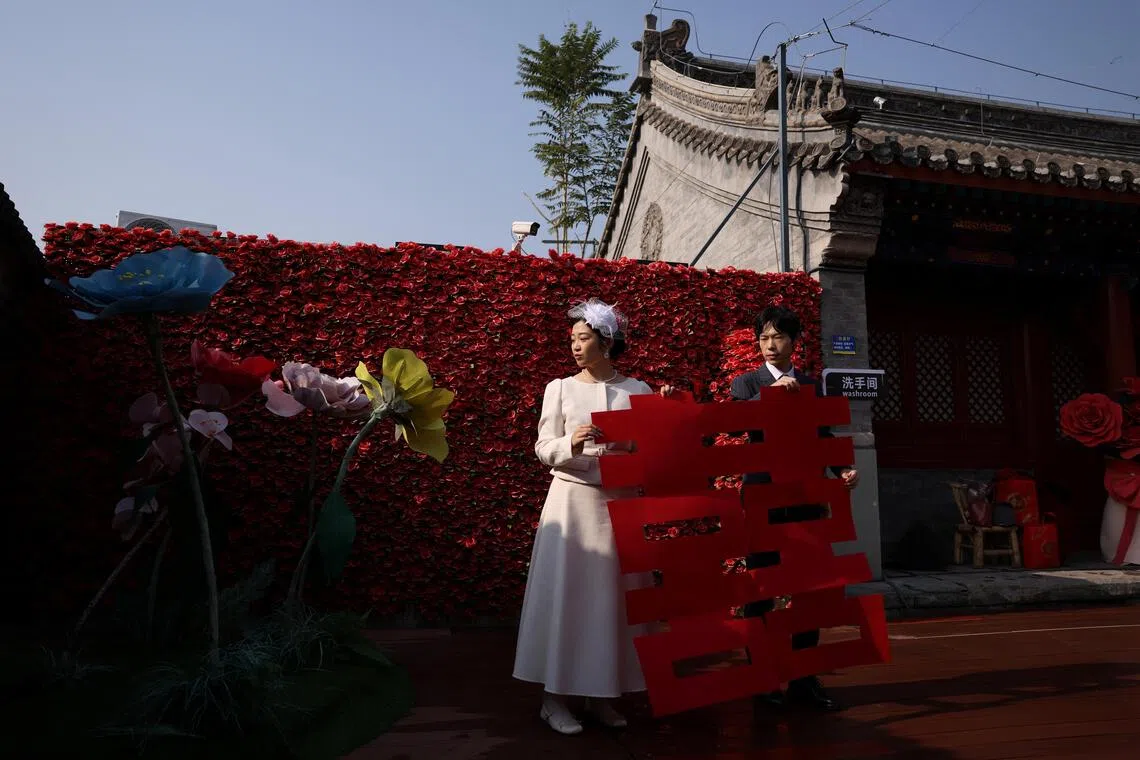In China, wedding bells are ringing in nightclubs, a subway station and on snowy mountain peaks
Sign up now: Get insights on Asia's fast-moving developments

A couple holding a cut-out of the Chinese character Xi after registering their marriage at the Huguo Guanyin Temple in Beijing.
PHOTO: REUTERS
Follow topic:
BEIJING – When bank clerk Ren Yingxiao was looking for a honeymoon destination with her partner, they came across a scenic spot in the Xinjiang region that had it all – including a marriage registration office.
“So we thought, why not go there and get our marriage certificate as well?” the 30-year-old said about secluded Sayram Lake, where the authorities are trying to attract young Chinese to tie the knot as part of a nationwide push to boost marriage rates and ease the country’s demographic crisis.
In May, China started allowing couples to get married anywhere in the country – instead of their place of residence – making the process more convenient and the event more special.
Local governments have since started scrambling for marriage tourists, setting up registration offices around scenic spots, at music festivals – and even in subway stations, shopping malls and parks.
For now, the effort is working.
Marriages, which demographers use as a proxy for the country’s birth rate, rose 22.5 per cent from a year earlier to 1.61 million in the third quarter of 2025, putting China on track to halt a downtrend in annual nuptials which has gone almost uninterrupted for more than a decade.
The 20.5 per cent decline in marriages in 2024, to 6.1 million, was the biggest on record.
In the eastern city of Nanjing, couples can get married at the Confucius Temple, where they can have a Ming Dynasty-themed ceremony.
In south-western Chengdu, the authorities set up an office in the picturesque Xiling Snow Mountain at an altitude above 3,000m.
In eastern Hefei, a marriage booth opened in a subway station whose name, Xingfuba, translates to “the place of happiness”.
In Shanghai, couples can choose to get their certificate at a nightclub after appearing at a marriage registration office, thanks to a partnership between INS Park, a six-storey nightlife complex, and the Huangpu District Civil Affairs Bureau.
In Beijing, 31-year-old lawyer Wang Jieyi and 33-year-old Zhan Yongqiang, a bank employee, registered their marriage at the Huguo Guanyin Temple.
The temple was originally built to “safeguard the peace and tranquillity of the nation”, Ms Wang said. “And also, in our traditional religious culture, the Guanyin Temple is associated with auspicious events like marriage and giving birth, symbolising happiness and well-being.”
The couple said the new policy did not necessarily speed up their plans to get married, but it made the process more convenient, as they both work in Beijing and no longer need to go back to their native Shandong province.
“It made our lives a little bit easier,” Ms Wang said.
It’s a numbers game
Tourists go to Xinjiang’s Sayram Lake, where Ms Ren got married, for the steep mountains and quiet pastures surrounding it. But it is the lake’s geographical statistics that convince couples to marry there.
It stands 2,073m above sea level, a number that sounds like “love you deeply” in Chinese.
It has a surface area of 1,314sq km, and that figure is phonetically similar to “a lifetime”.
Xinjiang’s capital, Urumqi, is 520km away – homophonous with “I love you”.
“All those numbers have symbolic meanings,” Ms Ren said.
Demographer Yi Fuxian from the University of Wisconsin-Madison said the removal of geographic restrictions makes weddings easier in China, but he expects the positive results to be “short-lived”.
With the population declining, Dr Yi expects the number of women aged 20 to 34 to nearly halve to 58 million by 2050. Moreover, he expects young women – and their parents – to give greater priority to education and economic independence over marriage, in line with global trends.
Ms Ren concurred, saying she would have got married anyway. She believes marriage and birth rates will improve only when incomes start growing and people feel more financially secure.
“It’s unlikely that two people who didn’t plan to get married would suddenly decide to do it on impulse while travelling,” she said. “That’s not very realistic.” REUTERS

